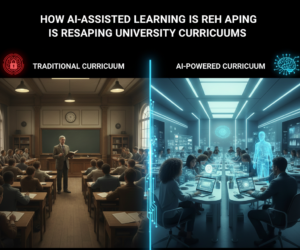Your Academic Performance and How Internships Can Help You Improve It

Your Academic Performance and How Internships Can Help You Improve It
Internships are considered as a stepping stone for a subsequent professional career by a significant number of students. Despite the fact that this is unquestionably true, the advantages of internships extend well beyond the mere act of generating a CV. The beneficial effect that internships may have on academic achievement is one of the benefits that is given the least amount of consideration. Internships often assist students in returning to their studies with a revitalized sense of purpose, increased abilities, and a greater grasp of the topics they are studying. This is because internships bridge the gap between educational theory and real-world experience.
An in-depth examination of the ways in which internships might improve academic performance is presented in this article. Internships provide students with both practical and psychological advantages that extend well beyond the time of the work experience.
Gaining an Understanding of the Relationship Between Learning and Working
It is not enough to just memorize information or pass tests in order to achieve academic success; rather, it is necessary to actively apply knowledge in meaningful ways. Students are able to put the ideas they have learned in class to the test via internships, which makes the content more applicable and simpler to comprehend. Because of this link to the actual world, students are often more engaged in their academic work.
Combining Classroom Learning with Real-World Experience to Strengthen Knowledge
When students complete their coursework in settings that are relevant to their area of study, the concepts they have acquired in the classroom take on a new significance. For instance, a marketing student who handles genuine campaigns during an internship would have a better knowledge of marketing tactics when they appear in textbooks. This is because the student has gained practical experience.
Learning to Think Critically Develops Your Skills
In the course of an internship, you will encounter circumstances that need you to think strategically, solve problems, and make decisions. Students who acquire these abilities become more proficient in evaluating case studies, writing research papers, and participating in classroom discussions, all of which directly contribute to an improvement in their academic achievement.
Acquiring Skills in Time Management That Can Be Applied to Academics
Punctuality, completing deadlines, and the ability to juggle several responsibilities are all requirements for internships. Students who gain the ability to efficiently manage their time in the job often carry that discipline back to their academic routines, which ultimately results in improved study habits and timely assignment submissions.
Skills in research and analysis that have been improved
Research, data collecting, and analysis are abilities that are very essential for academic assignments, and many internships demand these talents being shown. Students develop a greater capacity for information collecting and interpretation when they participate in a variety of activities, such as the preparation of a business report or the execution of a scientific experiment.
Inspiring Confidence in One’s Capabilities in the Classroom
An internship may help a student feel more confident in their academic ability by providing them with real-world experience that they can use in their studies. They are able to approach their studies with a greater sense of self-assurance and excitement when they realize that the information they possess is valuable outside the confines of the classroom.
Skills in Communication and Presentation that have been Improved
The sharing of professional information is often required during internships, whether it be via emails, reports, or presentations. These enhanced communication skills immediately transfer into higher academic achievement, particularly in the context of group projects and oral presentations.
Clarity of vision for one’s career might motivate
Students encounter a number of problems, one of the most significant of which is maintaining their motivation when they do not completely see how their academic pursuits will transfer into a job. Students are provided with a concrete incentive to put effort into their academic work via the establishment of internships, which give this clarity.
Utilizing Real Feedback in the Context of Academic Programs
The feedback that is received during an internship comes not only from the supervisors but also from the customers and the coworkers. Students may improve their work and take a more professional attitude to their academic tasks by learning from constructive criticism and applying what they have learned.
Developing Better Networking Skills in Order to Facilitate Academic Collaboration
Students get the ability to interact with professionals via the process of networking during internships. This is a skill that may be transferred to academic life by improving the students’ ability to collaborate with their classmates, teachers, and research partners.
Exposure to the Tools and Technologies Used in the Industry
Through internships, students often get access to software, equipment, or procedures that are considered industry standards. They have the ability to thrive in schoolwork that incorporates these technologies as a result of this early exposure, which sometimes gives them an edge over their peers with regard to competition.
Putting Together a More Powerful Academic Resume
It is possible to include internship experiences into academic portfolios and research ideas, which may boost applications for academic contests, graduate programs, and grants.
Imaginative Subjects for Research and Assignments to Consider
As a result of working in a professional environment, students are exposed to real-world issues and trends in the business, which often results in the generation of novel ideas for essays, research papers, and capstone projects.
Improving One’s Capacity to Adapt to Unexpected Circumstances in the Classroom
Internships teach adaptation, which is a vital attribute for facing unexpected academic problems such as last-minute project revisions or hard test questions. The workplace may be unpredictable, and internships teach adaptability.
The Long-Term Advantages of Continual Learning for Academic Performance
The mentality of one who is always learning is fostered via internships. When students return to their studies, they often do so with a deeper respect for education that continues throughout their lives, which boosts their interest and academic perseverance.




